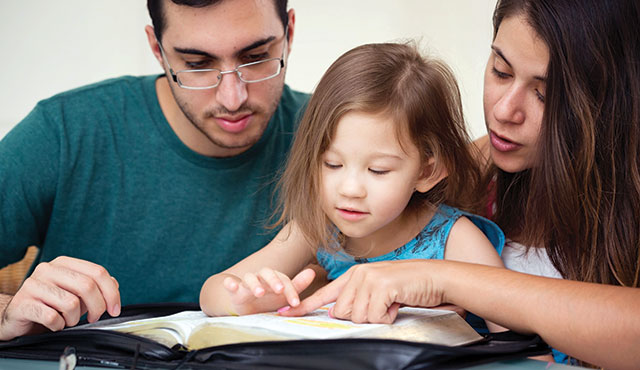The catechism of the Catholic Church makes it clear that parents are the primary educators of their children – and that includes teaching kids about their faith.
In the midst of the many issues posed by the novel coronavirus crisis, it’s critical that parents not only lead by their examples – of forgiveness, respect, fidelity, and service – but also teach their kids what it means to be good Catholics.
Fortunately, even though churches remain shuttered in the face of COVID-19, a wealth of online resources make it relatively simple to share the beauty of our faith at home.
“The parish, schools, our family, friends, and neighbors all contribute to the formation of our children and are valuable partners and supporters,” says Linda Ji, diocesan director of Pastoral Care for Families in All Stages. “But ultimately, parents are the primary agents of faith formation.
“This is something I think gets lost in family life these days,” Ji adds, “especially as family life has become so challenging. We wish to empower and equip parents to be what they already are and to give them confidence to teach and guide their children rightly.”
This is a message, she says, that she must repeatedly hear herself as a parent, and appreciates when God affirms in prayer.
While some local parishes are offering faith formation classes via Zoom or Google, others are providing hard copy materials and lesson plans to parents, explains Katie Dawson, Diocese of Orange Director of Parish Evangelization and Faith Formation.
Still, Dawson notes, there remains uncertainty about faith formation classes, including preparation for sacraments such as first Holy Communion, reconciliation, and confirmation. To offer parents both flexibility and creativity, the Diocese of Orange offers a number of resources via a new website, EvangelizeOC.com.
In addition, Dawson adds, many online resources support parents in their efforts to share their faith, including the Orange Catholic Parents Facebook page, a prayer app called hallow.app, and a website, thefamilydinnerproject.org, among many others.
“Our priority in this moment is not to approach faith formation as another class, but to use our resources at a moment of human challenge and suffering,” Dawson says. “This is why we need God in our lives to sustain us.”
Dawson and Ji emphasize that teaching kids the formal prayers of the Church is not as important as praying as family every day, talking about faith to one’s children and spouse, attending virtual Mass together, and inviting God into our daily lives.
“It’s never too late to offer our lives to God,” Dawson says. “It can be very simple, as simple as saying, ‘Let’s take a minute and ask God to show Himself to us.’ That’s a prayer. ‘Lord, be with us.’ We’re not expecting angels and apparitions. Faith is something that builds.”
Our present isolated circumstances offer families a unique opportunity, Ji notes. “In the business of life, we rely on the Church community to teach our children, but praying together and talking about our faith should be things we are doing anyway.”
Even sharing our continuing struggles with uncertainty, depression and anxiety can provide children with valuable lessons about how our faith provides comfort, Ji says. “Health is a part of what God wants for us – our well-being and wholeness.
“God loves us and wants us to be healthy.”

